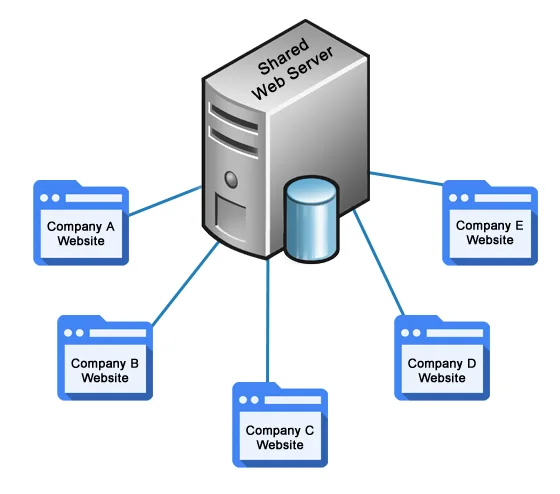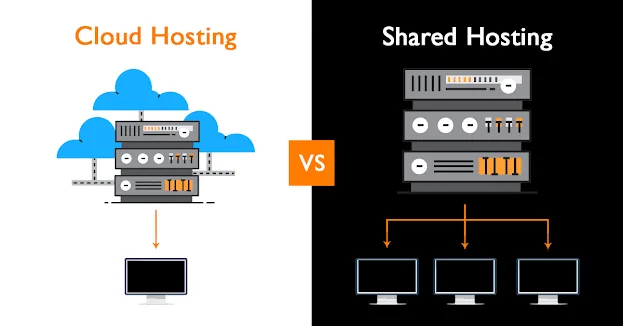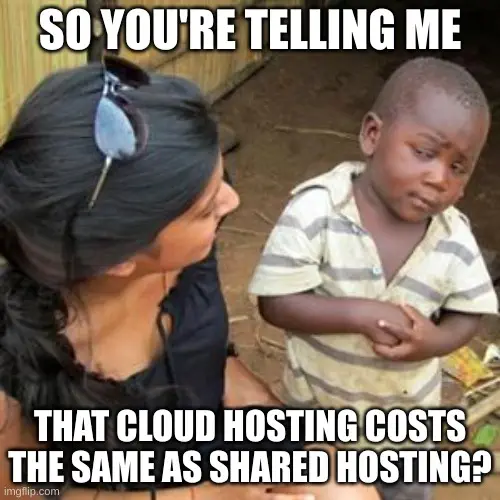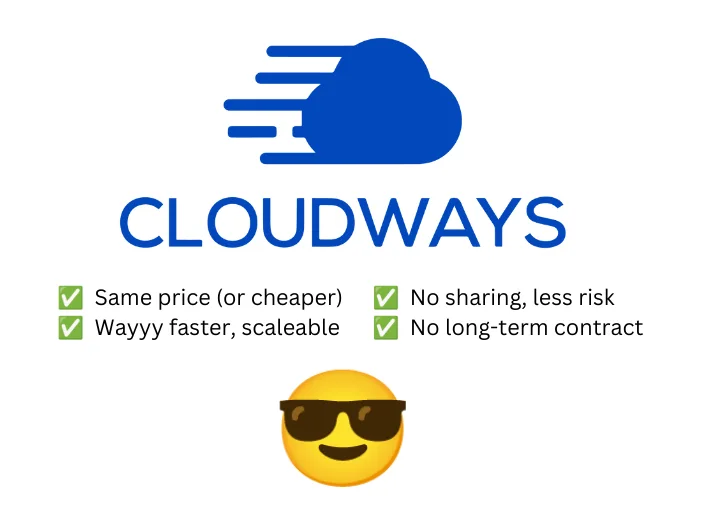Hey, if you had to choose between a Lamborghini and a Toyota Tercel, and they were exactly the same price, which one would you choose? You’d choose the Lambo of course. Because why not, if they cost the same… right?
It’s kind of the same thing when it comes to web hosting, but not everybody knows about it.

Shared hosting is the Tercel in this analogy. It’s everywhere, it’s the most common type of web hosting, and it’s been around forever. It’s what almost everyone signs up for, when they’re building their first website.
The entry-level offerings on Bluehost, Siteground, GoDaddy, HostGator, and all the other big hosting companies are all shared hosting.
And honestly, if you sign up for shared hosting, it’s not the end of the world. Just like if you buy that Tercel. It will get you where you need to go, and it will probably be fine.
Well, part of the time it will be fine, and other times it will cause you a headache. Sometimes shared hosting will cause your site to be down, and you won’t even notice it. And your site might be slower at certain times of the day, but again you won’t notice it.
Why? Because it’s shared hosting. The resources are shared. You’re on a server with many other customers, and you’re all sharing the same CPU, the same RAM, the same hard drive, and the same pipelines to the rest of the internet.

And sometimes that works fine. But web hosts are known to be money-hungry (especially the ones owned by EIG). Which means they cram too many customers onto the same server and hope nobody notices.
If another customer on that shared web hosting partition has a runaway script or AI bot, and it’s hogging a lot of resources, guess who feels the pain? That’s right — it’s you.
Or if your website becomes big and popular, it will start slowing down too, because you’re only driving a Tercel.
Your site will still load (eventually).
And maybe it seems fast enough to you, but speed is perhaps the most important criteria for websites.
You want to get this speed thing right, trust me. You don’t want Google to penalize you for having a slower-than-normal site. You want to get rewarded in the search results for having a super-fast site instead.
Here’s another scary idea: what if another customer on that shared hosting has a vulnerability or some other weakness that allows malware or hackers to access the whole server, including your site? Sounds fun, doesn’t it?
Cloud hosting = Lamborghini

Cloud hosting is the sexy alternative, and for years it’s been too expensive — out of reach for ordinary people like you and me. That’s no longer true, and in some cases it might even be cheaper (more details in the next section).
So, what makes cloud hosting better?
For one, you’re not sharing resources. You have your own “slice”. You have a certain percentage of the CPU and RAM and server which are specifically set aside for you.
That means nobody else’s runaway website can slow your website down.

What’s more, you’re directly connected to the “big pipes” and backbones of the internet, like Amazon AWS and Digital Ocean. These are some seriously speedy servers.
Now your site has the potential to be verrrry fast, as fast as a Lamborghini. You can leave those Tercels in the dust! And Google will love you, and reward you in the search rankings.
And if you need a bigger “slice”, i.e. more RAM, more CPU, or more servers because your website is successful and popular, it’s really easy to scale up and scale down. Literally it’s just the click of a button.
Get the Lambo for the same price
Cloud hosting used to be way more expensive, like $80 per month. It ain’t that expensive anymore! A company called Cloudways has changed everything.
In fact, in some cases cloud hosting is actually cheaper than shared hosting from the big companies.

GoDaddy, BlueHost, Siteground, HostGator, A2Hosting — all these companies offer extremely attractive intro rates. They’ll say something like “Get fast webhosting for only $3.95 per month!”
And that is indeed what it costs at first. Keep in mind that it’s shared hosting.
The sneaky part is when it’s time to renew. That $3.95 suddenly jumps up to $12 or even $15 per month. For a Tercel.
Here are some specific comparisons, with proof and screenshots:
- Cloudways costs the same as Bluehost (and it’s way faster)
- GoDaddy pricing vs. Cloudways pricing
- Siteground pricing vs. Cloudways pricing
- HostGator pricing vs. Cloudways pricing
- A2Hosting pricing vs. Cloudways pricing
Guess how much the Lambo costs? Cloudways starts at $12 per month. Remember, this is crazy-fast cloud hosting on Digital Ocean servers, not shared hosting.
And it stays at $12 per month — they don’t suddenly jack up their prices when it’s time to renew.
Personally, I really appreciate that. I’m tired of the bait & switch bullshit, and I appreciate it when companies are up front about what their service costs.
Did I mention there’s no contract with Cloudways? With the other hosts, you’re locked into a 12-month or longer contract, and you have to pay for all of it up front.
With Cloudways, you only pay at the end of each month. And there’s no contract, so if you wanna take the Lamborghini for a spin and then cancel after a couple of months, no problem.
Same price, better speed = no-brainer

So if it’s the same price (or cheaper) to get better speed, better performance, and no yearly contract… well it’s kind of a no-brainer in my opinion.
Forget Siteground and Bluehost and their greedy server-cramming ways. I made my decision a long time ago and I now host all my sites with Cloudways.
Guess how many problems I have on a regular basis now that I’ve switched? Here’s a hint: it starts with a “z” and rhymes with “hero”.
I never get any alerts saying I need to upgrade because I’m using too many resources. I never get any warnings about my usage. I don’t get arm-twisted or tricked into paying for a more expensive tier, or for add-ons that I don’t need.
I traded in my Tercel for a Lamborghini, and I now pay less money each month to have faster websites.
For some reason this is still falling under the radar for most people, so that’s why I felt compelled to do this write up. I hope it was helpful for you!

